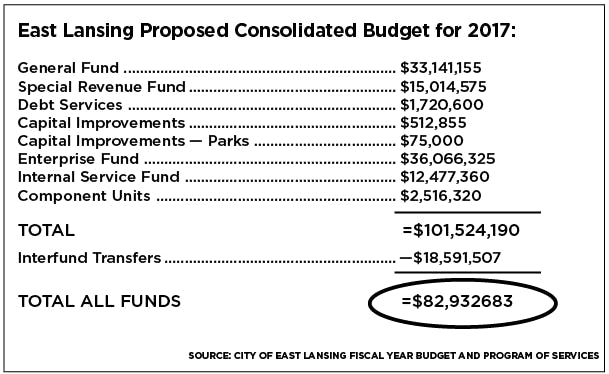The East Lansing City Council and the directors of multiple East Lansing city departments met on Tuesday for a special budget work session to review the city’s 2017 budget. The purpose of the meeting was to express to the council the challenges facing the city. This comes on the heels of the Financial Health Review Team’s formation earlier this year to address and make suggestions for the city’s financial future.
The council not only reviewed the general fund budget, but also other funds for the city in what makes up the city’s consolidated fund. A budget was only proposed and not set in stone, as the budget has factors, such as outside influences like unexpected costs, which could alter its projected numbers.
But just as with meetings with the Financial Health Review Team, the overarching message was clear.
“Expenses are going up faster than revenues,” City Manager George Lahanas said during the presentation.
The general fund budget for fiscal year 2017 was estimated to be $33,141,155, which is just more than an 8 percent decrease from the fiscal year 2016 amended budgets projects of a $36,045,985 general fund.
That 8 percent, or $2,904,830, decrease from 2016 is due in large part to a $2 million contribution by the city to its pension program. The remaining money, $904,830 is being transferred to other funds the city operates.
The general fund is primarily funded through taxes at 49.5 percent and is mostly used for public safety at 64.8 percent.
While the city is primarily concerned with the general fund, it operates other funds as well, including multiple funds it houses under the title of special revenues fund.
Under special revenue funds is the major streets fund, local streets fund and solid waste management fund, to name a few.
The other funds and the general fund all combine to form the consolidated budget, which after interfund transfer deductions, is $82,932,683.
The other funds will see the most movement this year.
The major street fund will see a 15.2 percent increase from the 2016 amended budget because of increases in the gas and weight tax revenues.
But, the budget also calls for 24.4 percent of the gas and weight taxes collected to be sent to the local street fund.
The parks and recreation fund is $4,354,850, which is a 12-percent increase of $468,015 from the 2016 budget. It’s also boosted by a general fund operating transfer of $1,831,200, which is an increase of $488,770 from the 2016 budget.
According to the budget, “The transfer increase, in part, is due to the following; $306,895 for general government indirect cost allocation, $167,913 for soccer complex maintenance being moved from the parks maintenance budget in the General Fund to this fund, increased contributions of $10,000 for Summer Solstice Jazz Festival, $5,000 for the Great Lakes Folk Festival, $5,000 for Helping Hands Respite Care, and $4,000 for the Emerging Leaders Program.”
Furthermore, residents will see fee changes for services provided by the city.
Residents with school-age children using the School Age Child Care Program have to pay 50 cents more per day for after school care and a $1 more per day for half day care and field trips when the calendar reaches the fall of 2017.
Residents using the Family Aquatic Center will pay a “$1 increase for resident daily admission from $6 to $7 and a $10 increase for resident 10 visit pass from $40 to $50 are proposed for the 2017 summer season,” according to the budget.
Under the solid waste management fund, the money allotted sits at $1,952,790 for 2017 a decrease from 2016 by 15.7 percent, which is “primarily due to the higher than usual expenditures in (fiscal year 2016) related to the recycling cart rollout,” according to the budget.
Under this as well, it was recommended that residents will pay $85 a year instead of $75 for a 96-gallon cart and “yard waste bags and stickers are recommended for an increase from $1.50 to $1.75 each, the first increase in over 10 years. Bulk stickers are recommended for an increase from $15 to $17, the first in over 10 years.”
Support student media!
Please consider donating to The State News and help fund the future of journalism.
The parking system’s budget is set at $6,525,660, a significant increase from 2016 because of the M.A.C. garage rehabilitation project and the city’s purchase of a new “Parking Access Revenue Control (PARC) system.” These would require debt financing of $6.375 million. The city calls the updates “critical needs.”
With parking, the city recommended an increase to the special event parking rate “from $1.70 to $3.00 per hour after the first two hours of the standard rate and an increase of the daily max for parking from $15 to $20.” That would bring in an estimated $52,000.
Parking permits would also increase $5 monthly under the proposed 2017 budget.
The budget isn’t set in stone, however, as the council set a public hearing as required, for its May 10 meeting.
Residents can voice their opinions and concerns over the budget but these hearings are not high attendance, Lahanas said.
Council can also make changes to the budget as well.
Discussion
Share and discuss “East Lansing budget to decrease by 8 percent during 2017 fiscal year” on social media.







